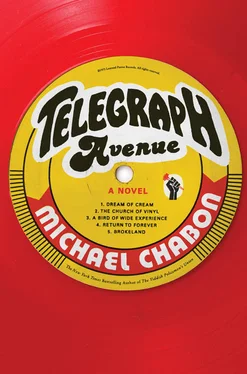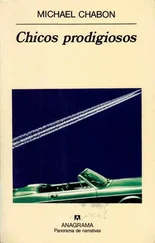“Oh, no, sure—”
“I just hate to add to the pile.”
“I totally understand.”
“Got to keep mobile.”
“Of course.”
“Travel light.”
“Right-o.”
“How much,” Luther Stallings said, lowering his voice to a near-whisper. Swallowing, starting over, louder the second time. “How much you get for my card by itself.”
“Oh, uh,” Mr. Nostalgia said, understanding a microsecond or two too late to pull off the lie that he was going to have to tell it. “A hundred. Ninety, a hundred bucks.”
“No shit.”
“Like around ninety.”
“Uh-huh. Tell you what. You give me this one card, Luther Stallings in… I’m going to make a wild guess and say it was Enter the Panther. ”
“Has to be.” Mr. Nostalgia felt the play begin again, the game that Luther Stallings was trying to run on him and, somehow, on Gibson Goode.
“And I’m a sign it, okay?” Here it came. “Then I’m a trade it back to you for forty-five bucks.”
“Okay,” Mr. Nostalgia said, feeling unaccountably saddened, crushed, by the pachyderm weight of a grief that encompassed him and Stallings and every man plying his lonely way in this hall through the molder and dust of the bins. The world of card shows had always felt like a kind of true fellowship to Mr. Nostalgia, a league of solitary men united in their pursuit of the lost glories of a vanished world. Now that vision struck him as pie in the sky at best and as falsehood at the very worst. The past was irretrievable, the league of lonely men a fiction, the pursuit of the past a doomed attempt to run a hustle on mortality.
“If that’s how you want it,” Mr. Nostalgia said. He was not averse, in principle, to raising the five-dollar value of the Stallings card by a factor of three or four. But as he handed Stallings the gold-filled Cross pen, a bar mitzvah gift from his grandparents that he liked to use when he was getting something signed for his own collection, he wished that he had never come out from behind the table, had let the security guards sweep Luther Stallings past Mr. Nostalgia’s Neighborhood and clear on out of the Kaiser Center.
Over the course of the next half hour, he checked on Stallings a couple of times as the man made his way to the end of the signing line for Gibson Goode, then inched his way to the front one lonely man at a time. In the middle of selling a 1936 Wolverine gum card, “The Fight with the Shark,” for $550 to a dentist from Danville, Mr. Nostalgia happened to glance over and see that Luther Stallings had regained his place at the front. The bodyguard got to his feet looking ready, as promised, to suspend mercy, but after a brownout of his smile, Gibson Goode reached for the bodyguard and gently stiff-armed him, palm to the big man’s chest, and the big man, with a mighty headshake, stepped off. Words passed between Goode and Stallings—quietly, without agitation. To Mr. Nostalgia, reading lips and gestures, sometimes able to pick up a word, a phrase, the conversation seemed to boil down to Gibson Goode saying no repeatedly, with blank politesse, while Luther Stallings tried to come up with new ways of getting Goode to say yes.
There was only so much of this that the people in line behind Luther Stallings were willing to put up with. A rumor of Stallings’s earlier outburst, his near-ejection, began to circulate among them. There was a certain amount of moaning and kvetching. Somebody gave voice to the collective desire for Stallings to Come on!
Stallings ignored it all. “You asked him?” he said, raising his voice as he had done an hour ago, when the blue blazers came to see how he might like to try getting himself tossed. “You asked him about Popcorn ?” Talking loudly enough for Mr. Nostalgia and everybody in the neighborhood to hear. “Then I got the man for you. Hooked him. You know I did.”
The expressions of impatience, general down the line, rose to outright jeering. Stallings turned on the crowd, trying to scowl them into silence, snapping at a man in a Hawaiian shirt standing two guys behind him. The man said, “No, fuck you !”
Wading into the signing area, arms windmilling to reach for Stallings in a kind of freestyle of aggression, came the two blue blazers, Shaved Ball and the Soviet. They took brusque hold of Stallings’s arms, faces compressed as if to resist a stink, and jerked his arms back and toward his spine.
Two seconds later, no more, Shaved Ball and the Soviet were lying flat on their backs on the painted cement floor of the hall. Mr. Nostalgia could not have said for certain which of them had taken the kick to the head, which the punch to the abdomen, or if Luther Stallings had even moved very much at all. As they’d gone tumbling backward, the line of autograph seekers had shuddered, rippled. Human turbulence troubled all the surrounding lines, people waiting for Chris Mullin, Shawn Green.
“Bitch,” Stallings said, turning back to Gibson Goode, in his polo shirt, with his sockless loafers. “I want my twenty-five grand!”
Gibson Goode, being Gibson Goode, Mr. Nostalgia supposed, might have had no choice in the matter: He kept, as his legend said he must, his cool. The same quiet, restraining hand against his bodyguard’s chest. Unintimidated. Still smiling. He took out his wallet, opened it, and counted out ten bills, rapid-fire. Slid them across the signing table. Luther Stallings studied them, head down, chest rising and falling. The money lay there, exciting comment in the line, ten duplicate cards from the highly collectable Dead Presidents series. Luther shook his head once. Then he reached down and took the money. Resigned—long since resigned, Mr. Nostalgia thought—to doing things he knew he was going to regret. When he went past Mr. Nostalgia’s table, without so much as a thank-you, he had not managed to get his chin up again.
It was only later, as a voice on the PA was chasing stragglers from the hall and the lights went out over the signing area, that Mr. Nostalgia noticed Luther Stallings had walked off with his gold pen.
On a Saturday night in August 1973, outside the Bit o’ Honey Lounge, a crocodile-green ’70 Toronado sat purring its crocodile purr. Its chrome grin stretched beguiling and wide as the western horizon.
“Define ‘toronado,’” said the man riding shotgun.
Behind his heavy-rimmed glasses, he had sleepy eyes, but he scorned sleep and frowned upon the somnolence of others. In defiance of political fashion, he greased his long hair, and its undulant luster was clear-coat deep. His name was Chandler Bankwell Flowers III. His grandfather, father, and uncles were all morticians, men of sobriety and pomp, and he inhabited a floating yet permanent zone of rebellion against them. Nineteen months aboard the Bon Homme Richard had left Chan Flowers with an amphetamine habit and a tattoo of Tuffy the Ghost on the inside of his left forearm. The shotgun, holstered in a plastic trash bag alongside his right leg, was a pump-action Mossberg 500.
“‘Define’ it?” said the driver, Luther Stallings, not giving the matter his full attention. His eyes, green flecked with gold, kept finding excuses to visit the rearview mirror. “It’s the name of a car.”
“But what does it mean ? What is the definition of the word ‘toronado.’ Tell me that.”
“You tell me,” Luther said, more wary now.
“It’s a question.”
“Yeah, but what are you really asking?”
“Toro- nah -do.” Chan strumming the “R” like a string of Ricky Ricardo’s guitar. “You’re driving it. Talking about it. In love with it. Don’t even know what it means.”
Luther massaged the leather cover on the steering wheel as if feeling for a cyst. He took another glance in the mirror, then leaned forward to look past Chan at the Bit o’ Honey’s front door. Where Chan ran to dark and stocky, Luther Stallings was long and light-skinned, with an astronaut chin. He had served one tour in the U.S. Army, most of it spent splintering planks with his feet for a hand-to-hand combat demonstration team. He was dressed as for dancing, tight plaid bell-bottom slacks, a short-sleeved terry pullover. His hair rose freshly stoked into a momentous Afro.
Читать дальше
Конец ознакомительного отрывка
Купить книгу












